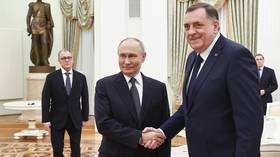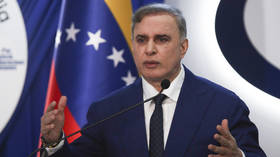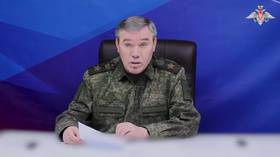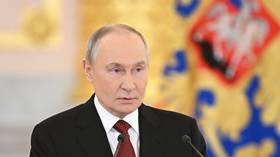Interpol refuses request to arrest Bosnian Serb leader

Interpol has rejected a request by Bosnia and Herzogovina to issue wanted alerts for the president and parliament speaker of Republika Srpska – the Serb-majority region within the country. Bosnian Serb leader Milorad Dodik made the announcement on X on Wednesday.
Bosnia's state court also confirmed to Reuters that an attempt to issue a Red Notice - a global request to locate and provisionally arrest a person - for Dodik and parliament speaker Nenad Stevandic had failed.
Interpol’s decision followed an appeal from neighboring Serbia, which argued that Sarajevo’s request was politically motivated and violated Interpol's neutrality principles.
”I just received a call from [Serbian] President Aleksandar Vucic to inform me that… that Interpol rejected the request of the Court of Bosnia and Herzegovina to issue a red notice for [Speaker Nenad] Stevandic and me,” Dodik wrote on X on Wednesday.
The Court of Bosnia and Herzegovina had sought the Interpol notice after Dodik defied an arrest warrant at home and traveled to Serbia, Israel, and Russia in March. Dodik and Stevandic have been accused of “attacking the constitutional order” by allegedly enacting laws that restrict the operations of Bosnia’s state-level judiciary and law enforcement agencies.
Created under the 1995 US-brokered Dayton Peace Agreement, Bosnia and Herzegovina is comprised of the Bosniak-Croat Federation and Republika Srpska, with a tripartite presidency and an international overseer – the Office of the High Representative (OHR).
Dodik has long rejected the OHR’s authority, accusing it of overreach and undermining Republika Srpska’s autonomy. He was sentenced in February to a year in prison and a six-year political ban for defying the OHR.
The Serbian leadership vowed to prevent the detention of Republika Srpska’s top officials and described Sarajevo’s moves as a “continuous attempt at revenge” against Dodik and the Serbian people.
Russia denounced Dodik’s conviction as an “absolutely political” decision by the Bosnia and Herzegovina judiciary based on a “pseudo-law” pushed through by the OHR.
Earlier this week, Dodik visited Russia for talks with Russian President Vladimir Putin. In an interview with RT, he said the Dayton Agreement is no longer upheld and that he is seeking Putin's assistance in bringing the situation to the UN Security Council.













